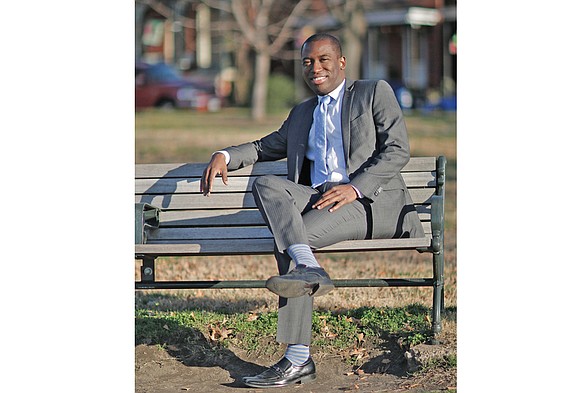$3.4B:City Council approves 2018-2020 spending plan
Jeremy M. Lazarus | 5/19/2018, 1:31 p.m.
Richmond high school students will be able to take unlimited free rides on GRTC buses beginning July 1.
Organized activities for city youths also will be beefed up starting in July, with city recreation centers operating longer hours and after-school programs at elementary and middle schools being upgraded.
More streets are to be paved and more sidewalks are to be fixed, while residents who conserve water will pay slightly smaller monthly bills.
However, on July 1, vehicle owners also will starting paying an extra $7 a year to register their cars and trucks in the city, and diners at restaurant will pay an extra 1.5 percent in tax to help finance construction of up to four new schools.
In addition, the cost of parking at street meters will be going up at least 25 cents an hour, and those who fail to feed the meter will see the cost of the fine rise by $5.
Those are among the highlights of the new two-year, $3.4 billion spending plan that Richmond City Council passed Monday without controversy and debate.
Of that total, about $1.4 billion is earmarked for general fund operations, essentially city government operations, in the 2018-2019 fiscal year that begins July 1 and the 2019-2020 fiscal year that will begin July 1, 2019.
About $720 million is to be spent on general fund operations in the first year of the biennium, or about $3,228 per Richmond resident, a 4 percent increase from current spending.
The rest of the funding is split among the capital program that pays for improvements to city infrastructure such as buildings, parks and roadways, public utilities, federal and state grants, internal programs like the radio shop and fleet operations and other elements of the government.
Mayor Levar M. Stoney was upbeat about the passage of the plan, particularly after the council approved a spending blueprint that virtually kept intact the proposal he provided in March.
“This is a values-based, fiscally responsible plan that invests in and improves upon our targeted priorities, including core services, public safety, poverty mitigation and education,” he said in a statement issued after the 9-0 vote.
“I am particularly proud of the roughly $40 million we have dedicated in this spending plan toward meeting the needs of our children,” he continued. He also praised the council for delivering a plan that “sets us on a sound fiscal path for continued growth.”
During discussions, several council members, including Kristen N. Larson, 4th District, and Ellen F. Robertson, 6th District, said the budget falls short of seriously addressing infrastructure needs, such as obsolete school buildings, potholed streets and broken sidewalks. “We’re going to have to do better,” Ms. Larson said.
City employees are among the big winners in the spending plan.
Effective July 1, they will be eligible for a new benefit — four weeks of paid leave for birth mothers and four weeks of parental bonding leave for fathers, with the benefit also applying to employees who adopt.
City employees also will receive up to two weeks of paid leave to care for a sick parent.
The council also approved a 1 percent, across-the-board wage increase for employees who are not police officers or firefighters and who do not work for the sheriff or other constitutional officers. However, the council saved money by delaying the raise until January.
With help from the mayor, the council also provided funding for its top priority, salary improvements for sworn police and firefighters that were initiated during the current fiscal year and will continue in the 2019-20 fiscal year. Council previously estimated that the three-year program would shift $27 million into salary upgrades for police and firefighters.
The council also granted Police Chief Alfred Durham additional funds to assign officers to patrol public housing communities in a bid to reduce crime.
Despite the mayor’s claim that the spending plan focuses on education, Richmond Public Schools clearly was one of the big losers.
In the capital budget, council approved the mayor’s plan to borrow $150 million for replacement schools, still far short of the $224 million the School Board initially sought.
The $150 million, to be repaid from the 1.5 percent meals tax hike, also appears to fall $45 million short of the projected cost to replace four schools — George Wythe High, Elkardt-Thompson Middle and Greene and George Mason Elementary schools. The School Board previously projected the four buildings would cost $195 million to build.
Meanwhile, council went along with the mayor and limited maintenance funding for existing schools to $1.6 million in the 2018-19 fiscal year and to $3.5 million in the 2019-20 fiscal. The School Board had requested $31 million for fiscal 2018-19.
Superintendent Jason Kamras sought to show that he has less than $1 million left to spend for school maintenance for the current fiscal year, but he could not convince council that the money was depleted.
The School Board also was shot down on its request for an additional $11 million to beef up its academic offerings and make other improvements to its operations.
Like the mayor, the council also rejected any increase. Instead, the council returned to the School Board about $12.5 million that schools failed to spend in the 2016-17 school year, telling the board and Mr. Kamras to use that money first before asking for more.
The School Board’s effort to stockpile that money as an emergency fund undermined arguments that the city is not providing sufficient funds and also may have left the council skeptical about Mr. Kamras’ claims about school maintenance.






